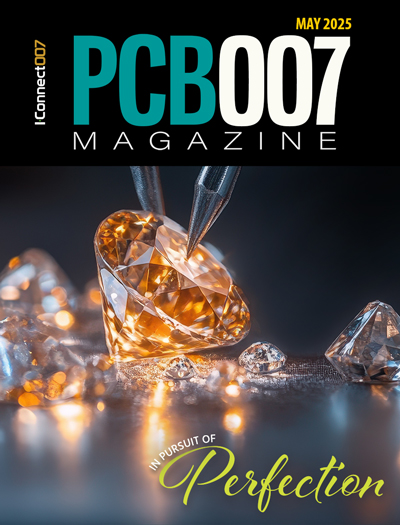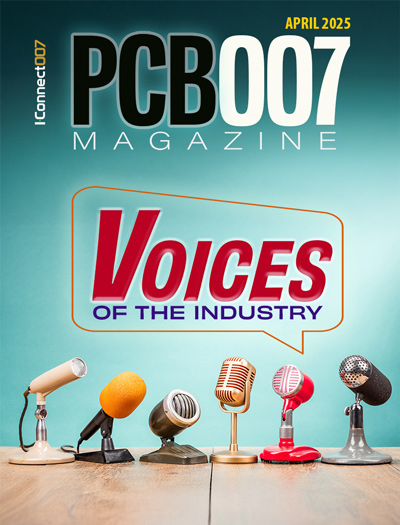-

- News
- Books
Featured Books
- pcb007 Magazine
Latest Issues
Current Issue
The Hole Truth: Via Integrity in an HDI World
From the drilled hole to registration across multiple sequential lamination cycles, to the quality of your copper plating, via reliability in an HDI world is becoming an ever-greater challenge. This month we look at “The Hole Truth,” from creating the “perfect” via to how you can assure via quality and reliability, the first time, every time.

In Pursuit of Perfection: Defect Reduction
For bare PCB board fabrication, defect reduction is a critical aspect of a company's bottom line profitability. In this issue, we examine how imaging, etching, and plating processes can provide information and insight into reducing defects and increasing yields.

Voices of the Industry
We take the pulse of the PCB industry by sharing insights from leading fabricators and suppliers in this month's issue. We've gathered their thoughts on the new U.S. administration, spending, the war in Ukraine, and their most pressing needs. It’s an eye-opening and enlightening look behind the curtain.
- Articles
- Columns
- Links
- Media kit
||| MENU - pcb007 Magazine
Aspocomp's 2017 Financial Information Restated in Accordance With New Accounting Principles
April 19, 2018 | AspocompEstimated reading time: 2 minutes
Aspocomp Group Plc adjusts its 2018 opening statement of financial position due to the adoption of the following new and amended IFRS standards: Amendments to IFRS 9 Financial Instruments and the new IFRS 15 Revenue from Contracts with Customers.
IFRS 9 Financial Instruments
IFRS 9 Financial Instruments introduced new requirements for the classification and measurement of financial assets. In summary, it includes revised guidance on the classification, recognition and measurement of financial assets, new general hedge accounting requirements and a new expected credit loss model for calculating impairment on financial assets. Furthermore, IFRS 9 requires disclosures.
Aspocomp does not have significant amounts of financial instruments except customer receivables and interest rate derivates. Aspocomp does not apply hedge accounting as defined by IFRS.
Aspocomp applies the simplified approach to recognize lifetime expected credit losses for its trade receivables and amounts due from customers under long-term projects as required or permitted by IFRS 9. In general, the application of the expected credit loss model of IFRS 9 resulted in earlier recognition of credit losses for the respective items regarding overdue receivables for which the Group has not previously recognized generic credit loss provisions. Following this, the Group has made an adjustment of EUR -0.05 million in retained earnings and trade receivables as at January 1, 2018.
IFRS 15 Revenue from Contracts with Customers
IFRS 15 Revenue from Contracts with Customers establishes a single comprehensive model for entities to use in accounting for revenue arising from contracts with customers (effective for financial periods beginning on or after January 1, 2018 in the EU). IFRS 15 superseded IAS 18 Revenue, IAS 11 Construction Contracts and the related interpretations. The core principle of IFRS 15 is that an entity should recognize revenue to depict the transfer of promised goods or services to customers with an amount that reflects the consideration to which the entity expects to be entitled in exchange for those goods or services. Under IFRS 15, an entity recognizes revenue when (or as) a performance obligation is satisfied, i.e., when control of the good or service underlying the particular performance obligation is transferred to the customer. These principles are applied using the following five steps:
1. Identify the contract(s) with a customer
2. Identify the performance obligations in the contract
3. Determine the transaction price
4. Allocate the transaction price to the performance obligations in the contract
5. Recognize revenue
The Group does not engage in project sales or recognize revenue on the basis of percentage of completion. The bulk of the Group’s sales comprise ordinary orders and deliveries of products, and such revenue is recognized in accordance with the criteria of the delivery terms as currently in force. On the other hand, the Group has agreed on consignment warehousing with certain customers, which may mean that the recognition of revenue from such performance obligations may result in the earlier timing of earnings, with revenue being recognized when the product arrives in the warehouse.
Furthermore, IFRS 15 requires extensive disclosures.
Aspocomp has adopted IFRS 15 Revenue from Contracts with Customers as of January 1, 2018.
Aspocomp Group Plc's financial reporting and transition. The effect is based on the anticipated revenue recognition.
The adoption of the standard had an impact of EUR 0.1 million on shareholders’ equity in the Group’s opening balance sheet of January 1, 2018, and EUR 1.0 million on net sales for January-December, 2017. In addition, in the statement of financial position, trade receivables of EUR 1.0 million and inventories of EUR -0.8 million were adjusted following the IFRS 15 adoption.
Suggested Items
TT Electronics Achieves ISO 13485 Medical Certification at Mexicali EMS Facility
06/27/2025 | TT ElectronicsThis milestone underscores TT Electronics’ commitment to delivering high-quality, compliant, and reliable manufacturing solutions to its global customers in healthcare and life sciences.
CEE PCB Appoints KT Technical Solutions as North American Sales Representative
06/23/2025 | CEE PCBStrategic Partnership Expands CEE PCB’s Reach into the North American Market with a Focus on Customer-Centric Service and High-Quality Manufacturing
Benchmark Strengthens Presence in Jalisco with Grand Opening of Advanced Manufacturing Facility in Guadalajara
06/21/2025 | BUSINESS WIREBenchmark Electronics, Inc., a global provider of engineering, design, and manufacturing services, celebrated the grand opening of its brand-new manufacturing facility in Guadalajara, Mexico.
PMGC Holdings Signs Letter of Intent to Acquire Profitable U.S.-Based Electronics Manufacturing Company
06/10/2025 | Globe NewswirePMGC Holdings Inc., a diversified public holding company, is pleased to announce the signing of a non-binding Letter of Intent (LOI) to acquire a U.S.-based, cash-flow positive electronics contract manufacturing company with over 40 years of operational history.
VeriSilicon’s AI-ISP Custom Chip Solution Enables Mass Production of Customer’s Smartphones
06/09/2025 | BUSINESS WIREVeriSilicon recently announced that its AI-ISP custom chip solution has been successfully adopted in a customer’s mass-produced smartphones, reaffirming the company’s comprehensive one-stop custom silicon service capabilities in AI vision processing.


